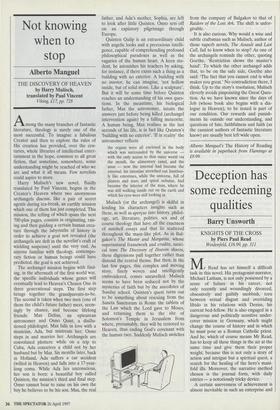Not knowing when to stop
Alberto Manguel
THE DISCOVERY OF HEAVEN by Harry Mulisch, translated by Paul Vincent Viking, £17, pp. 728 Among the many branches of fantastic literature, theology is surely one of the most successful. To imagine a fabulous Creator and then to explore the rules of His creation has provided, over the cen- turies, whole libraries of intellectual enter- tainment in the hope, common to all great fiction, that sometime, somewhere, some understanding might be reached of who we are and what it all means. Few novelists could aspire to more.
Harry Mulisch's new novel, fluidly translated by Paul Vincent, begins in the Creator's Heaven where two anonymous archangels discuss, like a pair of secret agents during tea-break, an earthly mission which one of them has just completed. This mission, the telling of which spans the next 700-plus pages, consists in originating, rais- ing and then guiding a certain human crea- ture through the labyrinths of history in order to achieve a goal not revealed (the archangels are deft in the npvelist's craft of wielding suspense) until the very end. As anyone familiar with theology, contempo- rary fiction or human beings could have predicted, the goal is not achieved.
The archangel mission begins with find- ing, in the aftermath of the first world war, the specific individuals whose genes will eventually lead to Heaven's Chosen One in three generational steps. The first step brings together the grandparents-to-be. The second is taken when two men (one of them the child's future father) meet, seem- ingly by chance, and become lifelong friends: Max Delius, an epicurean astronomer and Onno Quist, a disillu- sioned philologist. Max falls in love with a musician, Ada, but mistreats her; Onno steps in and marries her. Archangels are convoluted plotters: while on a trip to Cuba, Ada conceives a child not by her husband but by Max. Six months later, back in Holland, Ada suffers a car accident (willed in Heaven) and falls into a 17-year- long coma. While Ada lies unconscious, her son is born: a beautiful boy called Quinten, the mission's third and final step. Onno cannot bear to raise on his own the boy he believes to be his son. Max, the real father, and Ada's mother, Sophia, are left to look after little Quinten. Onno sets off on an expiatory pilgrimage through Europe.
Quinten Quilp is an extraordinary child with angelic looks and a precocious intelli- gence, capable of comprehending profound philosophical paradoxes as well as the vagaries of the human heart. A keen stu- dent, he astonishes his teachers by asking, for instance, if there exists such a thing as a building with no exterior. A building with no interior, he can imagine, 'not hollow inside, but of solid stone. Like a sculpture'. But it will be some time before Quinten reaches an understanding of his own ques- tions. In the meantime, his biological father, Max the astronomer, intuits the answers just before being killed (archangel intervention again) by a falling meteorite. A human being, Max realises in the last seconds of his life, is in fact like Quinten's `building with no exterior'. 'If in reality' the astronomer reflects
the organs were all enclosed in the body which was surrounded by the universe with the only access to that outer world via the mouth, the alimentary canal, and the anus — now the internal had become the external: his intestine stretched out limitless- ly like extestines, while the universe, full of planets and stars and spiral nebulae, had become the interior of the man, where he was still walking inside out on the earth and which his eyes were still looking at.
Mulisch (or the archangel) is skilful in lending his characters insights such as these, as well as apercus into history, philol- ogy, art, literature, politics, sex and of course theology that have all the exactness of nutshell essays and that lie scattered throughout the maze-like plot. As in Bul- gakov's The Master and Margarita, whose supernatural framework and erudite, satiri- cal tone The Discovery of Heaven shares, these digressions pull together rather than distend the central theme. But then, in the last few pages, this complex and moving story, finely woven and intelligently embroidered, comes unravelled. Mulisch seems to have been seduced not by the mysteries of faith but by the anecdotes of Sunday school. Quinten's quest turns out to be something about rescuing from the Sancta Sanctorum in Rome the tablets of the Law which the Lord gave to Moses, and returning them to the site of Solomon's Temple in Jerusalem from where, presumably, they will be restored to Heaven, thus ending God's covenant with the human race. Suddenly Mulisch switches from the company of Bulgakov to that of Raiders of the Lost Ark. The shift is unfor- givable.
It is also curious. Why would a wise and subtle craftsman such as Mulisch, author of those superb novels, The Assault and Last Call, fail to know when to stop? As one of the archangels reminds the other, quoting Goethe, 'Restriction shows the master's hand'. To which the other archangel adds that, to be on the safe side, Goethe also said: 'The fact that you cannot end is what makes you great.' No contradiction there, I think. Up to the story's resolution, Mulisch cleverly avoids pinpointing the Great Ques- tion. As we have known since the days of Job (whose book also begins with a dia- logue in Heaven), to be tested is part of our condition. Our rewards and punish- ments lie outside our understanding, and questions of fate, faithfulness and faith (as the canniest authors of fantastic literature know) are usually best left wide open.
Alberto Manguel's The History of Reading is available in paperback from Flamingo at £9.99.


































































 Previous page
Previous page